America’s Watershed Initiative: Sustaining a Critical Waterway
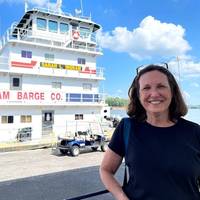
Kimberly Lutz and America’s Watershed Initiative (AWI) are making every effort to sustain the Mississippi River for generations to come.The Mississippi River is one of the world’s largest river systems and is arguably America’s most critical waterway. Flowing over 2,350 miles, spanning, at points, up to eleven miles, and discharging approximately 593,003 cubic feet of water per second into the Gulf of Mexico, the Mighty Mississippi is awe inspiring in terms of its natural characteristics as well as its commercial impact on both the American and global economies.
ABS Opens LNG Training Center in Doha for Qatari Seafarers

Classification organization ABS will open a global liquified natural gas (LNG) training center in Doha, Qatar, as part of its support of Qatar’s National Vision 2030 and the Tawteen Program, which focuses on education and quality employment for Qatari nationals.In collaboration with local corporations, the training center will focus on LNG production and operations, ensuring that seafarers are skilled to work with this dynamic fuel and the most modern fleet of vessels, ABS said.“LNG…
Ships Traveling the Thawing Arctic are Leaving Garbage in Their Wake
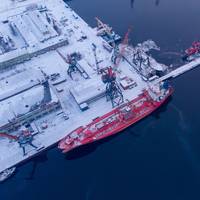
Following another year of stark climate impacts in the Arctic, scientists warned Tuesday of a new scourge hitting the region: marine trash.With the region warming twice as fast as the rest of the world, sea ice that has long blanketed the Arctic Ocean is disappearing, opening new routes to shipping. Scientists began noticing the trash bobbing in the icy water or piling up on Alaska Bering Strait-area beaches last year.“That’s a direct result of increased human maritime activities…
Inland Waterways: A Crucible of Issues
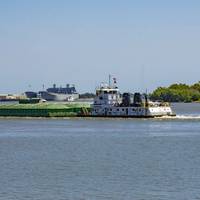
As 2022 appears on the not-so-distant horizon, we asked inland waterways executives to reflect on the major issues impacting their industry. Just how those issues evolve – and whether they present as challenges or opportunities – is, of course, unknown. Answers to some future questions will be relatively straightforward, confidently based on industry knowledge and experience. Other outcomes remain hazier, and next steps could be influenced by forces and players completely removed from the business of barges…
Maritime Groups Pleased with WRDA 2020
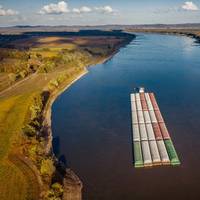
It was an odd legislative journey, but ultimately one with a happy ending. That’s one way to sum up the rather tortuous process that led to the passage of the Water Resources Development Act of 2020 (WRDA). For the first time WRDA (usually reauthorized every two years) was not enacted as its own legislative bill. This time it was rolled into the massive government 2021 omnibus budget bill, the ‘‘Consolidated Appropriations Act, 2021,’’ signed into law on December 27.Still, the WRDA text itself…
COVID-19’s Impacts on American Maritime Infrastructure
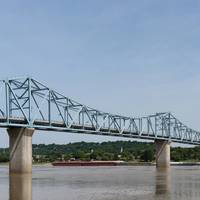
It goes without saying that America’s vast network of ports and inland waterways are crucial to the flow of maritime commerce, but these vital parts of U.S. infrastructure also play a big role in driving the greater national economy, support quality of life and ensure public health and safety. Still, no matter how clear and obvious the benefits, U.S. infrastructure as a whole (including roads, energy grids and, yes, ports and waterways among others) has fallen victim to underinvestment. It’s been this way for decades. In 2019, the U.S.
Arctic Region Experiences Second-Warmest Air Temperatures Ever Recorded
Arctic region experienced the second-warmest air temperatures ever recorded; the second-lowest overall sea-ice coverage; lowest recorded winter ice in the Bering Sea; and earlier plankton blooms due to early melting of sea ice in the Bering Sea - these are the findings of NOAA’s annual report card on the Arctic.The National Oceanic and Atmospheric Administration (NOAA) report, which measures the changing climate of the polar region including warmer air and ocean temperatures and declines in sea-ice that are driving shifts in animal habitats, said that in addition to annual updates on ocean temperature, snow cover, tundra greenness and melting on the Greenland Ice Sheet…
Arctic Posts Second Warmest Year On Record in 2018 -U.S. NOAA
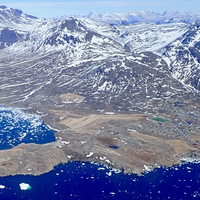
The Arctic had its second-hottest year on record in 2018, part of a warming trend that may be dramatically changing earth's weather patterns, according to a report released on Tuesday by the U.S. National Oceanographic and Atmospheric Administration."Arctic air temperatures for the past five years have exceeded all previous records since 1900," according to the annual NOAA study, the 2018 Arctic Report Card, which said the year was second only to 2016 in overall warmth in the region.It marks the latest in a series of warnings about climate change from U.S.
BY THE NUMBERS: U.S. Coast Guard - AWO Annual Safety Report
Issued at the National Quality Steering Committee (NQSC) meeting on July 31, 2018, the American Waterway Operators (AWO) and the U.S. Coast Guard (USCG) issued their annual report that benchmarks and further serves as the annual safety report card for the domestic towing industry. This year, it comes at a particularly timely moment, just on the heels of the deadline for the so-called ‘subchapter M’ towboat rules.The NQSC uses three measures to track overall trends in safety and environmental protection. These useful indicators of towing industry trends include (a.) Crew fatalities per 100,000 towing industry workers, (b.) Gallons of oil spilled from tank barges per million gallons transported, and (c.) The number and severity of towing vessel casualties.
American Society of Civil Engineers: Not Just a Tough Grader
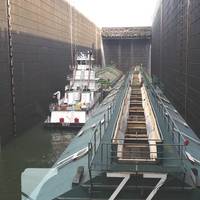
Within the U.S. inland waterways industry, any mention of the American Society of Civil Engineers (ASCE) will almost certainly be in reference to the “Infrastructure Report Card” that ASCE prepares and issues every four years, describing the condition and performance of America’s infrastructure in 16 categories: aviation, bridges, dams, drinking water, energy, hazardous waste, inland waterways, levees, ports, public parks, rail, roads, schools, solid waste, transit and waste water.
Op/Ed: Fix the HMTF Now … or in 2027

The Harbor Maintenance Trust Fund (HMTF) has been misused and underutilized for years, leaving U.S. ports and harbors in subpar conditions and disadvantaging the very shippers that pay to modernize and maintain them – to the tune of nearly $2 billion per year. In May, the U.S. House of Representatives’ (House) Committee on Transportation and Infrastructure (Committee) took a major step in the right direction by passing the Water Resources Development Act of 2016, which among other things…
40% Cruise Ships Use Outdated Sewage Treatment Plants
ACO Marine has welcomed the findings reported in the Friends of the Earth 2016 Cruise Ship Report Card, the annual survey of cruise shipping’s impact on the environment, which highlights a growing need for the sector to update its sewage treatment technology. The annual FOE survey, published in June, documented the environmental footprint of 17 cruise lines and 171 cruise ships, finding that a significant proportion of vessels continue to operate out-dated sewage treatment plant. The FOE found that 40% of cruiseships continue to use 35-year-old technology, calling for an urgent upgrade to systems capable of preventing environmental damage from the discharge of poorly treated black, grey and galley waste water streams.
Mississippi River Basin Gets a Grade of D+
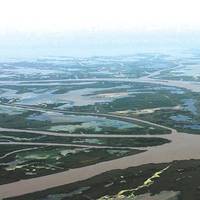
The Mississippi River basin has gotten a report card from a group that monitors watershed health and economic impact — and the grade is D+. The organization, America's Watershed Initiative, cited the poor condition of infrastructure such as locks and dams, and a lack of funding that could lead to water security issues. The Mississippi River watershed is the fourth-largest in the world, according to the group. It is made up of five river basins that flow across 31 states. It falls short in its goal of serving as the nation's most valuable water passage…
Antarctic Treaty Meeting Urged to Step Up Climate Change Role
As the 2015 Antarctic Treaty Consultative Meeting (ATCM) opens today in the Bulgarian capital, the Antarctic and Southern Ocean Coalition (ASOC) urged the ATCM to take action to promote the crucial importance of climate-related Antarctic research and its role in the Earth’s interconnected climate systems to the climate change community, including the United Nations Framework Convention on Climate Change (UNFCCC), in the run up this year’s COP21 climate summit in Paris. ASOC is also calling on the ATCM, which runs until June 10th, to take all possible actions to address climate change taking place within the Antarctic region, including through focused dialogue within the Commission for the Conservation of Antarctic Marine Living Resources (CCAMLR)…
US Counter-piracyTeam Earns Panama's Approval
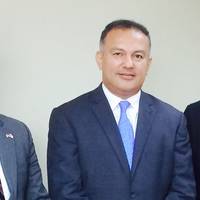
Meridian’s counter-piracy teams may now operate aboard vessels flying the Panama flag, following a vetting process that validated the quality of the US-based private maritime security company. The final decision was made this week by the Panama Maritime Authority, which administers the world’s largest flag State. The vetting process included scrutiny of Meridian’s reputation, financial stability, training standards, firearms handling accountability, corporate structure and proof of ISO 9001:2008 certification.
Maritime Administrator Paul “Chip” Jaenichen to Close NMDay 2014
Acting Maritime Administrator, Paul “Chip” Jaenichen will close the “Safety at Sea” Seminar being hosted by North American Marine Environment Protection Association (NAMEPA) at the National Press Club from 2:30-6:00pm. NAMEPA’s seminar will join industry and governmental leaders as they discuss issues of the day surrounding Safety at Sea. The seminar is designed to highlight both best practices and opportunities for improvement. Immediately following the “Safety at Sea” seminar is the AMVER Awards Dinner where over 150 companies will be recognized for their participation in the United States Coast Guard’s (USCG) Automated Mutual-Assistance Vessel Rescue (AMVER) system.
WCI Reacts to ASCE 2013 Report Card

Waterways Council, Inc., (WCI) has received the 2013 Report Card for America’s Infrastructure from the American Society of Civil Engineers (ASCE) and the inland waterways have received a grade of D-. The Report Card assesses the condition of a number of the nation’s infrastructure systems, including the inland waterways, and is released every four years. Each category is evaluated based upon capacity, condition, funding, future need, operation and maintenance, public safety, resilience and innovation.
Port Association Discusses ASCE' Report Card
Commenting on the release of the American Society of Civil Engineers’ (ASCE) 2013 Report Card for American Infrastructure, Kurt Nagle, president and CEO of the American Association of Port Authorities (AAPA), said, “AAPA is pleased that ASCE included seaports for the first time in its critical infrastructure Report Card. “AAPA played an active role in providing information and insight about seaports to ASCE. The 'C' grade given seaport-related infrastructure in its study reinforces our viewpoint that the federal government is not investing nearly enough in the landside and waterside connections to ports. The report card reiterates what other national and international studies have concluded about the neglected state of our nation’s port related transportation infrastructure…
Insights: Kurt J. Nagle, President and Chief Executive Officer Association of Port Authorities
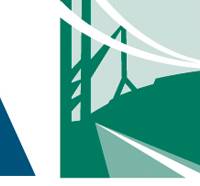
Kurt Nagle needs no introduction to MarineNews readers. With more than 30 years of experience in seaports and international trade, he has since 1995 served as President and Chief Executive Officer for the American Association of Port Authorities (AAPA). Mr. Nagle began working at AAPA, the alliance of the leading public port authorities throughout the Western Hemisphere, in 1985. And, although some may associate him more with ‘bluewater’ issues, Nagle also knows that the health of all U.S.
Is it Safer to Work Offshore in 2013?

It has been over three years since the tragic accident occurred aboard the Deepwater Horizon on April 20, 2010. The industry and the relevant federal agencies have done much to put in place improved safeguards to prevent such an accident – which left 11 dead and 17 injured – from happening again. Congress, on the other hand, has done little to intervene to force new requirements on either the federal government or industry. Meanwhile, energy-related work in the Gulf of Mexico is rapidly increasing and forecasts are that it will remain busy for the next few years.
AAPA Supports Newly-Introduced BRIDGE Act
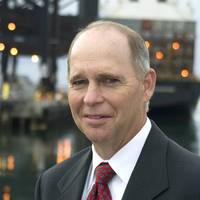
Following introduction yesterday of the Building and Renewing Infrastructure for Development and Growth in Employment (BRIDGE) Act by Senators Mark Warner (D-Va.) and Roy Blunt (R-Mo.), American Association of Port Authorities (AAPA) President and CEO Kurt Nagle commended the senators’ commitment to improving America’s infrastructure, saying initiatives like the BRIDGE Act are vital to strengthening America’s economy and international competitiveness. “This legislation is a positive step toward increasing investment in our nation’s critical infrastructure…
Can Fracking Waste be Carried on the Water?
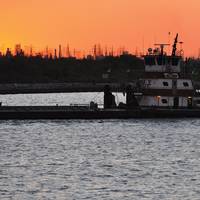
The barging industry has the answer. It’s nowhere near as complicated as it seems. As shale gas production continues to ramp up across the United States, millions of gallons of wastewater is created through the process of hydraulic fracturing, or fracking. That waste, referred to as shale gas extraction wastewater (SGEWW), or frack water, needs transport to storage and reprocessing facilities around the U.S., including disposal sites in Louisiana, Texas and Ohio. At the moment, the cargo is carried solely by rail and truck.
Arctic 'Report Card' 2012 Published
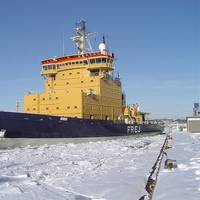
NOAA publishes its annual report tracking recent Arctic environmental changes. What’s new in 2012? New records set for snow extent, sea ice extent and ice sheet surface melting , despite air temperatures - a key cause of melting - being unremarkable relative to the last decade. Multiple observations provide strong evidence of widespread, sustained change driving Arctic environmental system into new state. Record low snow extent and low sea ice extent occurred in June and September, respectively. Growing season length is increasing along with tundra greenness and above-ground biomass.





